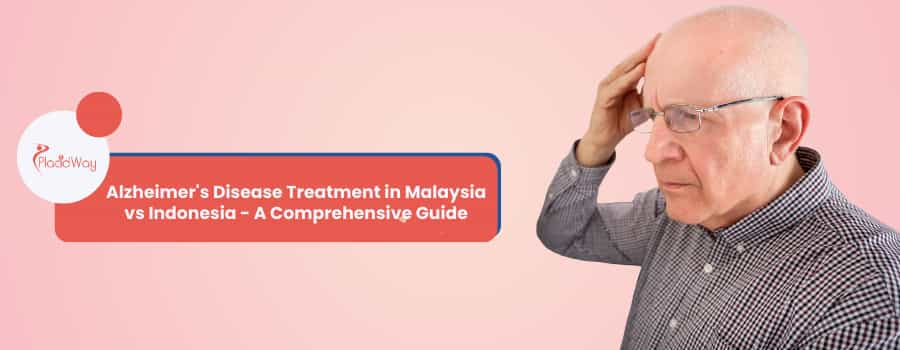
Deciding on the best location for Alzheimer's disease treatment for a loved one is a profoundly significant choice, involving careful consideration of medical expertise, treatment costs, accessibility, and the overall patient experience. Malaysia and Indonesia, two prominent nations in Southeast Asia, have both emerged as viable destinations for medical tourism, including neurological care. This comprehensive comparison aims to equip potential patients and their families with the critical information needed to make an informed decision between these two countries for advanced dementia and Alzheimer's care.
Choosing the Right Path: Alzheimer's Care in Malaysia or Indonesia?
Both Malaysia and Indonesia offer compelling reasons for international patients seeking Alzheimer's treatment. They present a stark contrast to Western healthcare costs while striving to maintain high standards of medical care and access to qualified specialists. Malaysia, with its well-developed medical tourism infrastructure and numerous internationally accredited hospitals, offers a blend of quality and convenience, particularly for those from neighboring regions or Western countries seeking advanced care for conditions like early-onset Alzheimer's or managing symptoms of vascular dementia.
Indonesia, on the other hand, a vast archipelago with a burgeoning healthcare sector, is rapidly enhancing its medical facilities, especially in major cities like Jakarta, Surabaya, and Bali. It provides highly competitive pricing and a growing pool of neurologists and geriatricians specializing in dementia and memory disorders. The choice between these two nations often hinges on specific priorities such as budget for Alzheimer's treatment cost, desired level of infrastructure, research engagement, and the preferred cultural environment for a potentially long-term care journey. Understanding the nuances of Alzheimer's care in Malaysia vs. Indonesia is crucial for families navigating this complex decision.
Alzheimer's Treatment: Malaysia vs. Indonesia at a Glance
Malaysia vs. Indonesia: Core Strengths in Alzheimer's and Dementia Care
Malaysia's Key Capabilities in Alzheimer's Treatment
Malaysia has a well-established reputation as a medical tourism hub, excelling in quality healthcare, including specialized neurological services. Its key strengths for Alzheimer's patients lie in its robust infrastructure, numerous JCI-accredited hospitals, and a high concentration of internationally trained specialists.
Cities like Kuala Lumpur and Penang offer comprehensive diagnostic services for memory loss, access to the latest FDA-approved medications for Alzheimer's, and a growing emphasis on holistic dementia care programs, including cognitive rehabilitation and support for caregivers.
The ease of communication with English-speaking staff and a highly regulated medical environment provide significant comfort for international patients seeking reliable Alzheimer's treatment options.
Indonesia's Key Capabilities in Dementia and Alzheimer's Care
Indonesia is rapidly advancing its healthcare sector, with a particular focus on improving specialized medical services. Its primary appeal for Alzheimer's patients is its highly competitive pricing and a rapidly expanding network of modern private hospitals, especially in its bustling metropolitan centers.
Indonesia offers a growing pool of dedicated neurologists and geriatricians, and patients can access essential pharmacological treatments for Alzheimer's disease. The focus is increasingly on early detection of dementia and providing accessible care solutions.
While infrastructure is still developing compared to Malaysia, the significant cost savings on treatments and daily living expenses make Indonesia an attractive option for those on a tighter budget seeking quality dementia care.
Alzheimer's Treatment in Malaysia - Pros and Cons for International Patients
Pros of Alzheimer's Treatment in Malaysia
- High Standard of Care: Numerous JCI-accredited hospitals and highly qualified specialists ensure quality care for Alzheimer's and dementia.
- Developed Medical Tourism Infrastructure: Smooth processes for international patients, including travel, accommodation, and medical coordination.
- English Proficiency: Widespread use of English reduces communication barriers in medical settings and daily life.
- Advanced Diagnostics: Ready access to cutting-edge diagnostic tools like PET scans for early Alzheimer's detection and precise diagnosis of memory disorders.
- Holistic Care Approach: Growing availability of non-pharmacological therapies, cognitive stimulation, and caregiver support programs.
- Geographic Accessibility: Excellent flight connections for patients from Asia, Australia, and parts of Europe.
Cons of Alzheimer's Treatment in Malaysia
- Higher Costs than Indonesia: While cheaper than Western countries, Alzheimer's treatment costs and living expenses can be slightly higher than in Indonesia.
- Competition for Specialist Appointments: In highly sought-after clinics, wait times for specialist neurologists or geriatricians might occur.
- Less Focus on Traditional Medicine Integration: While modern, Western medicine is dominant, less emphasis on integrating traditional Asian therapies compared to some other destinations.
Dementia Care in Indonesia - Pros and Cons for International Patients
Pros of Alzheimer's Treatment in Indonesia
- Highly Competitive Pricing: Significant cost savings on diagnostic procedures, medications, and long-term care for dementia.
- Growing Healthcare Sector: Rapid advancements in facilities and increasing number of specialized medical professionals.
- Accessible Care: Expanding public and private healthcare options, especially in major urban centers for memory disorders.
- Cultural Warmth & Support: A strong family-oriented culture that can be comforting for patients and caregivers.
- Affordable Living Costs: Overall lower cost of living can make extended stays more manageable for families.
Cons of Alzheimer's Treatment in Indonesia
- Variable Quality of Care: While top clinics are excellent, quality can be inconsistent outside major cities, requiring thorough research.
- Less Established Medical Tourism Infrastructure: May require more independent planning for travel, logistics, and accommodation compared to Malaysia.
- Potential Language Barrier: English is less universally spoken than in Malaysia, especially outside medical facilities, which might pose challenges.
- Limited Advanced Research: Fewer opportunities for participation in cutting-edge clinical trials for new Alzheimer's treatments.
What to Expect: The International Patient Experience for Dementia Care
Patient Experience in Malaysia for Alzheimer's Treatment
In Malaysia, the international patient experience for Alzheimer's treatment is often seamless and well-organized. Clinics and hospitals catering to medical tourists typically offer dedicated patient liaison services, assisting with appointments, accommodation, and even transportation. Communication is rarely an issue due to high English proficiency.
Patients can expect modern facilities, state-of-the-art equipment, and a professional, efficient approach to care. The environment is generally comfortable, with many private hospitals resembling luxury hotels, contributing to a less stressful experience for patients and their caregivers navigating memory loss treatment.
Patient Experience in Indonesia for Dementia Care
In Indonesia, the international patient experience, while rapidly improving, might require slightly more self-navigation outside of top-tier private hospitals. However, within these leading facilities, patients can expect warm hospitality and personalized attention. Medical staff in major clinics are often English-speaking, and interpreters can be arranged.
The overall cost-effectiveness extends to daily living, making extended stays more affordable. The cultural emphasis on family and community can provide a supportive backdrop for patients with Alzheimer's and their caregivers. While infrastructure outside major cities can be basic, urban centers offer highly advanced facilities for comprehensive dementia treatment.
Real Stories from Families Managing Dementia
Robert & Maria, Australia
"We chose Malaysia for my mother's early-stage Alzheimer's treatment. The ease of getting appointments, the professionalism of the neurologists in Kuala Lumpur, and the clear communication made a huge difference. The cost was significantly less than at home, and the care was top-notch."
John & Susan, UK
"For my father's dementia diagnosis, Indonesia offered an incredibly affordable option. The doctors in Jakarta were empathetic and thorough. While the logistics outside the hospital required some effort, the warmth of the people and the quality of care at the clinic surpassed our expectations. The cost savings were substantial for our long-term care plans."
Chong Li, Singapore
"My aunt required advanced neurological assessment for her memory issues. Malaysia’s private hospitals provided rapid access to PET scans and a multi-disciplinary team. The entire process, from consultation to medication management, was efficient and professional, giving us peace of mind with her Alzheimer's diagnosis."
Amara, Netherlands
"We sought a comprehensive dementia care program for my grandmother, and Indonesia offered a surprisingly good quality-to-cost ratio. The local support groups, though in Bahasa, had English-speaking facilitators and made us feel very connected. The long-term care options for her Alzheimer's were much more affordable."
Frequently Asked Questions About Alzheimer's Treatment in Southeast Asia
What types of Alzheimer's treatments are available in Malaysia and Indonesia?
Both Malaysia and Indonesia offer a range of treatments including FDA-approved medications (cholinesterase inhibitors, memantine), cognitive stimulation therapy, occupational therapy, physical therapy, and nutritional support. Advanced diagnostics like PET scans and MRI are also available. While pharmacological options are similar, the emphasis on non-pharmacological and integrative care may vary.
How do the costs of Alzheimer's diagnosis and treatment compare between Malaysia and Indonesia?
Generally, initial diagnostic consultations and basic medication costs are quite competitive in both countries, offering significant savings compared to Western nations. Malaysia tends to have slightly higher costs for advanced diagnostics and specialized private memory care facilities, while Indonesia offers very competitive pricing, particularly in its larger metropolitan areas. Comprehensive treatment plans are highly individualized and can vary.
Are there qualified Alzheimer's specialists and memory clinics in these countries?
Yes, both nations have a growing number of highly qualified neurologists and geriatricians specializing in dementia care. Malaysia boasts several dedicated memory clinics within its major hospitals, especially in Kuala Lumpur and Penang. Indonesia, particularly in Jakarta and Surabaya, also has specialized neurology departments and emerging memory care centers.
What are the common challenges for international patients seeking Alzheimer's care in Malaysia or Indonesia?
Common challenges include navigating a new healthcare system, potential language barriers (though many medical professionals speak English), understanding visa requirements for longer stays, and arranging for suitable long-term accommodation and caregiver support if needed. Ensuring continuity of care upon returning home is also a key consideration.
Are clinical trials for new Alzheimer's drugs available?
While less common than in North America or Europe, some leading medical centers in Malaysia (e.g., in Kuala Lumpur) and, to a lesser extent, Indonesia, do participate in international clinical trials for Alzheimer's disease. Patients would need to inquire directly with specialized memory centers or major university hospitals for current opportunities.
What kind of patient support and caregiver programs can I expect?
Both countries are developing more robust support systems. Malaysia has several non-profit organizations and private clinics offering caregiver training, support groups, and day care services for patients. Indonesia's support networks are often community-based and growing, with increasing awareness and resources in urban centers.
How important are hospital accreditations like JCI?
JCI (Joint Commission International) accreditation is a strong indicator of high-quality healthcare standards and patient safety. Both Malaysia and Indonesia have JCI-accredited hospitals, particularly in their capital cities. Opting for a JCI-accredited facility can provide an added layer of assurance for international patients, indicating adherence to global best practices in medical care.
Can I get a medical visa for extended Alzheimer's treatment?
Both Malaysia and Indonesia generally offer medical visa options for patients seeking extended treatment. The specifics, including duration and requirements, vary by country and your nationality. It's crucial to contact the respective embassies or consulates well in advance and consult with your chosen clinic, as they often assist with visa letters and documentation.
Is language a barrier for international patients?
In both Malaysia and Indonesia, particularly in major medical centers and tourist areas, English is widely spoken by medical professionals, administrative staff, and many urban residents. However, outside these circles, particularly in Indonesia, local language proficiency (Malay in Malaysia, Bahasa Indonesia in Indonesia) would be beneficial. Interpreters are usually available at top clinics.
What is the typical aftercare and follow-up process for international patients?
Reputable clinics in both countries will provide comprehensive medical reports and discharge summaries. They often facilitate remote consultations for follow-up and can communicate with your local doctor to ensure continuity of care. It's important to discuss the aftercare plan thoroughly before commencing treatment to ensure a smooth transition back home.
Ready to Take the Next Step in Alzheimer's Care?
Navigating Alzheimer's disease treatment options for a loved one is a journey that requires careful consideration and support. While this guide provides a detailed comparison, your specific needs and priorities are unique. At PlacidWay, we specialize in connecting families like yours with world-class, pre-vetted Alzheimer's treatment clinics in Malaysia, Indonesia, and other leading medical tourism destinations.
Our dedicated Care Team is here to provide a free, no-obligation consultation to help you explore personalized treatment packages, understand transparent pricing for dementia care, and answer all your specific questions about specialists, facilities, and logistics. Let us assist you in making an informed decision, so you can focus on supporting your loved one.




-Package-in-Kuala-Lumpur,-Malaysia-by-FirstCell.jpg)



.png)
.png)

.png)






Share this listing